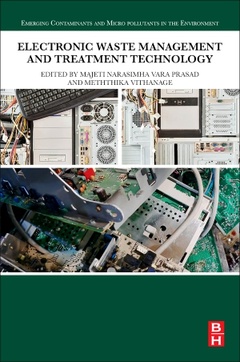Description
Electronic Waste Management and Treatment Technology
Coordinators: Vara Prasad Majeti Narasimha, Vithanage Meththika
Language: English
Subject for Electronic Waste Management and Treatment Technology:
Keywords
Electronic waste; health hazards; metallic fractions (MFs); non-metallic fractions (NMFs); recycling techniques and wastes printed circuit boards (WPCB); Energy from waste; renewable energy; toxic waste; municipal waste; food waste; waste from textile industry; biodiesel production; toxic waste management; chemical treatment; cracking; electro-beam treatment; energy extraction; fuel; carbon; power generation; steam generation
405 p. · 15x22.8 cm · Paperback
Description
/li>Contents
/li>Biography
/li>Comment
/li>
Electronic Waste Management and Treatment Technology applies the latest research for designing waste treatment and disposal strategies. Written for researchers who are exploring this emerging topic, the book begins with a short, but rigorous, discussion of electric waste management that outlines common hazardous materials. such as mercury, lead, silver and flame-retardants. The book also discusses the fate of metals contained in waste electrical and electronic equipment in municipal waste treatment. Materials and methods for the remediation, recycling and treatment of plastic waste collected from waste electrical and electronic equipment (WEEE) are also covered.
Finally, the book covers the depollution benchmarks for capacitors, batteries and printed circuit boards from waste electrical and electronic equipment (WEEE) and the recovery of waste printed circuit boards through pyrometallurgy.
1. Waste electrical and electronic equipment (WEEE): Flows, quantities and management, a global scenario 2. Inventorisation of E-Waste and Emerging trends in E-waste disposal with bench marks for depollution - global scenario 3. An overview of methods used for estimating e-waste amount 4. Network design for e-waste management 5. Environmental management of e-waste 6. Biorecovery of precious metal nanoparticles from electronic waste 7. Bioleaching of electronic waste using extreme acidophiles 8. Resource recovery from E-waste for environmental sustainability 9. Biotechnological initiatives in E-waste Management: Recycling and business opportunities 10. Hydrometallurgical Recovery of Metals from E-waste 11. Recovery of waste printed circuit boards through pyrometallurgy 12. E-waste Management in Australia: Current Status 13. Environmental management of E-waste in China 14. Chemical hazards associated with treatment of waste electrical and electronic equipment 15. Environmental contamination and health effects due to e-waste recycling
Majeti Narasimha Vara Prasad is Emeritus Professor in the School of Life Sciences at the
University of Hyderabad in India. He received his PhD in Botany from Lucknow University,
Lucknow. In past he worked as Lecturer at North Eastern Hill University, Lecturer & Reader at University of Hyderabad. He is also serving as reviewer in many scientific journals. He is professional member of National Institute of Ecology New Delhi, India, Bioenergy Society of India, New Delhi, Indian Network for Soil Contamination Research, New Delhi. He also completed 20 research projects. He has published 179 articles in peer review journals in which contributed as author/co-author. He supervised 17 PhD and 7 M.Phil students, all students received award in his supervision.Meththika Suharshini Vithanage’s contribution to science has been recognized by The World Academy of Sciences (TWAS) presenting the Fayzah M. Al-Kharafi award in 2020. She is a Fellow of the National Academy of Sciences, Sri Lanka and Institute of Chemistry, Ceylon. She was selected as one of the Early Career Women Scientists by the Organization for Women Scientists in Developing Countries, Italy. Additionally, she received the Best Graduate Researcher Award for Natural Hazards by the American Geophysical Union in 2010. Her outstanding performance in research publications was recognized by the Presidential Awards, Sri Lanka for 8 consecutive years from 2011. She has co-edited 4 books with Elsevier Inc in 2019 and 2020.
- Describes depollution benchmarks for capacitors, batteries and printed wiring boards from waste electronics
- Covers metals contained in waste electrical and electronic equipment in municipal waste
- Provides tactics for the recycling of mixed plastic waste from electrical and electronic equipment




